Forbidden City (Gùgōng 故宫) is the Imperial Palace used by Ming and Qing Dynasties. For over 500 years, Forbidden City was home to the country’s supreme power until the fall of the last Qing emperor.
Forbidden City Beijing was inscribed as a UNESCO World Heritage Site in 1987, with Shenyang Imperial Palace (Mukden Palace) joining the same list in 2004.
Tiananmen is located right at the center of Beijing. And Forbidden City is located directly to the north of Tiananmen. Therefore, you can combine visiting both Tiananmen and Forbidden City in the same day.
If you can only visit 1 place in the capital city of China, Forbidden City is the place you must visit in Beijing.
Please note: You need to bring your passport for entry.
Forbidden City Opening Hours
Forbidden City is open from Tuesday to Sunday (closed on Monday, except Public Holidays).
| High Season (1 Apr – 31 Oct) | Low Season (1 Nov – 31 Mar) |
|---|---|
| Gate Open: 8.30am | Gate Open: 8.30am |
| Gate Last entry: 4.10pm | Gate Last entry: 3.40pm |
| Gate Close: 5pm | Gate Close: 4.30pm |
The biggest number of crowd is usually arriving at Forbidden City from 10am to 1pm, therefore, it’s highly recommended to arrive before 10am. Anyway, the Palace is really huge, if you want to see everything, I encourage you to arrive no later than 9am!
If possible, try to avoid visiting public holidays when the Forbidden City is extremely crowded. Here are the days to avoid visiting Forbidden City:
- Chinese Summer Vacation (1 July – 31 August)
- May Day (1 May, lasts for about 3 days)
- National Day (1 October, lasts for about 7 days)
- Chinese New Year (usually in Jan/Feb, and lasts for about 7 days)
- Tomb Sweeping Day / Qingming Festival (usually in Apr, lasts for about 3 days)
- Dragon Boat Festival (usually in Jun, lasts for about 3 days)
- Mid-Autumn Festival (usually in Sep/Oct, lasts for about 3 days)
Forbidden City Entrance Fee
| High Season (1 Apr – 31 Oct) | Low Season (1 Nov – 31 Mar) |
|---|---|
| Admission ticket: RMB 60 | Admission ticket: RMB 40 |
| The Treasure Gallery: RMB 10 | The Treasure Gallery: RMB 10 |
| Gallery of Timepieces: RMB 10 | Gallery of Timepieces: RMB 10 |
How to Buy Forbidden City Entrance Ticket
Forbidden City only allows a limited number of visitors each day, therefore, it is impossible to buy same-day ticket. Advance reservation is necessary.
There are several ways to purchase Forbidden City tickets from what we learned:
a. Buy from WeChat
China’s local citizens can buy Forbidden City tickets directly from the official WeChat channel by scanning the WeChat QR code that can be found here.
We tried to use this method, however, we didn’t receive the OTP on our international phone numbers. Therefore, we couldn’t buy using this method. I guess this method is not available for international tourists.
b. Buy from the Official Website
For international visitors, you can purchase Forbidden City tickets directly from the official website without having to go through WeChat.
Thanks Reader James for sharing this useful information in the comment section. He had a smooth experience purchasing the tickets directly from official website.
c. Buy from Online Travel Agent (OTA)
For us, we visited when China started opening up in early 2023 and the online booking system wasn’t quite well-developed yet. At that time, the best option for us was to book our ticket online through OTA here. Upon booking, we had to wait several days for the agent to confirm our booking. After it was confirmed, we received a QR code.
On our visit day, we followed the instruction and headed to “Comprehensive Service Window” located before Meridian Gate, to register our passport. After that, we could use our passport to enter via the Meridian Gate.
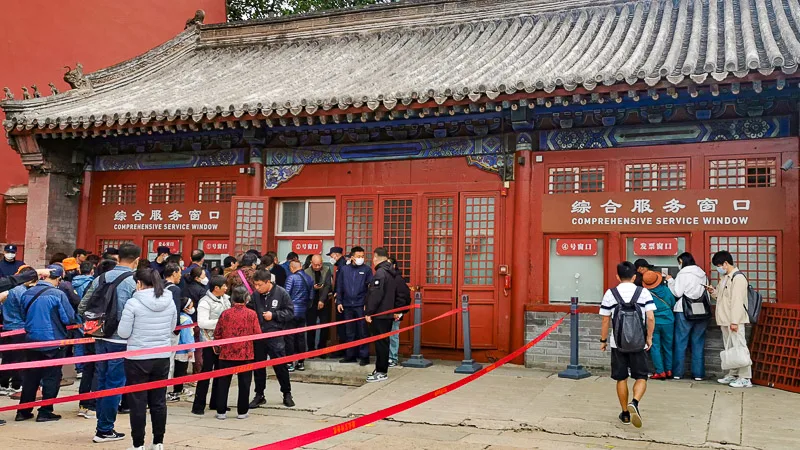
This method is slightly more expensive than buying direct, but it’s definitely worth the extra fee for convenience. Just be prepared that sometimes there is a chance that the travel agent enter your passport number wrongly and the ticket counter can’t find your booking.
For our case, the ticket counter were able to find our booking, but our booking was tagged with 3 other people whom we didn’t know. The staff said that all 5 of us had to redeem our ticket together. Otherwise, if we redeem only 2 tickets, the remaining 3 tickets will disappear from the system. But we did not know those people, how could we wait for someone we didn’t even know? We insisted we didn’t know the 3 people and we only purchased 2 tickets. I hope the 3 people didn’t get denied for entry. This is the risk that you’ll face when booking with OTA.
d. Buy on the spot in advance
We talked to a foreigner couple and learned that it is possible to buy ticket on the spot in advance. So, you just go to the “Comprehensive Service Window” located before Meridian Gate, and purchase your ticket for a future date.
It’s not easy to enter this area though. When coming from Tiananmen, you need to let the staff scan your passport. The staff would ask if you have already had an appointment, so you just tell them you’re going to buy a ticket, and that you can’t buy ticket online as a foreigner. Some staff won’t let you in if you don’t have appointment. So, I’m not sure how easy this method is.
How to go to Forbidden City
It’s compulsory to enter Forbidden City from the South Gate, which is Meridian Gate (near Tiananmen Square). Meanwhile, to exit Forbidden City, visitors can exit either from East Gate or North Gate.
To go to Duanmen, here are the methods:
- By Subway: Take Subway Line 1 and alight at either Tiananmen East Station or Tiananmen West Station.
- By Bus:
- Tiananmen East Bus Stop: Take bus 1, 2, 52, 82, 120, Sightseeing Bus Line 1 or Sightseeing Bus Line 2
- Tiananmen West Bus Stop: Take bus 1, 5, 52, Sightseeing Bus Line 1 or Sightseeing Bus Line 2
After coming out from subway station, or after alighting at the bus stop, you will need to pass through a passport scan and bag check in order to get to Tiananmen Tower.
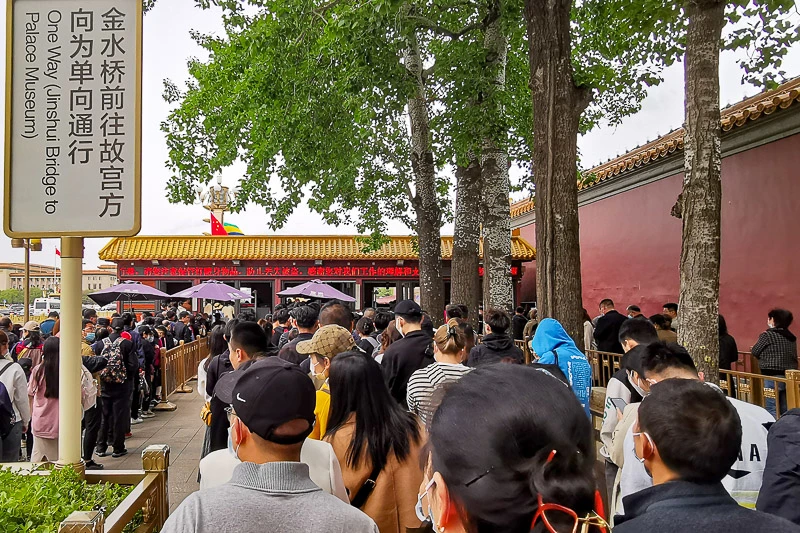
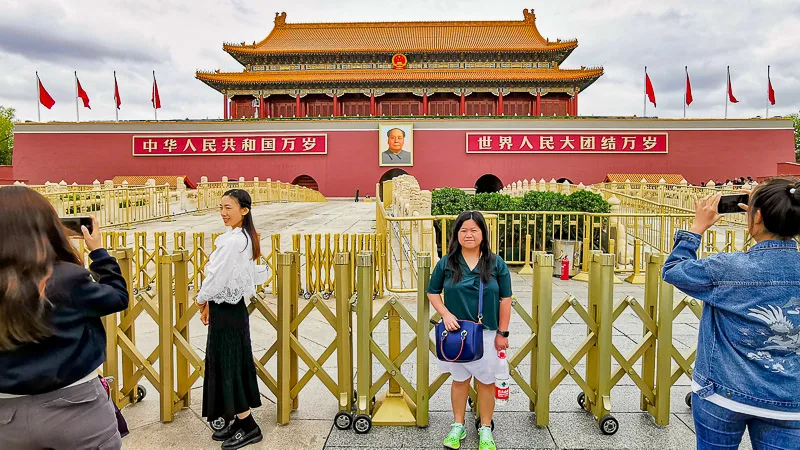
Walk through Tiananmen Tower, and you will see Duān mén (端门).
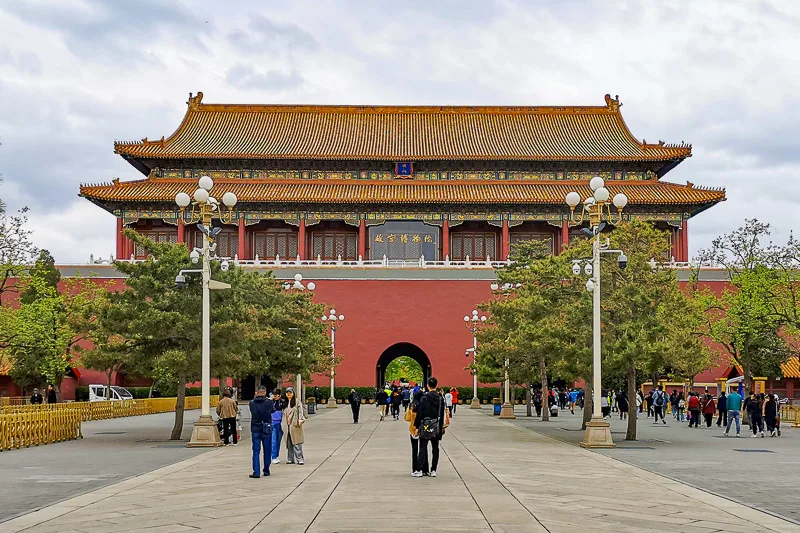
Walk through the Duanmen and you will arrive at a big field where “Visitor Center” and “Comprehensive Service Window” are located. If you need to exchange ticket or register passport, head to “Comprehensive Service Window” to do so.
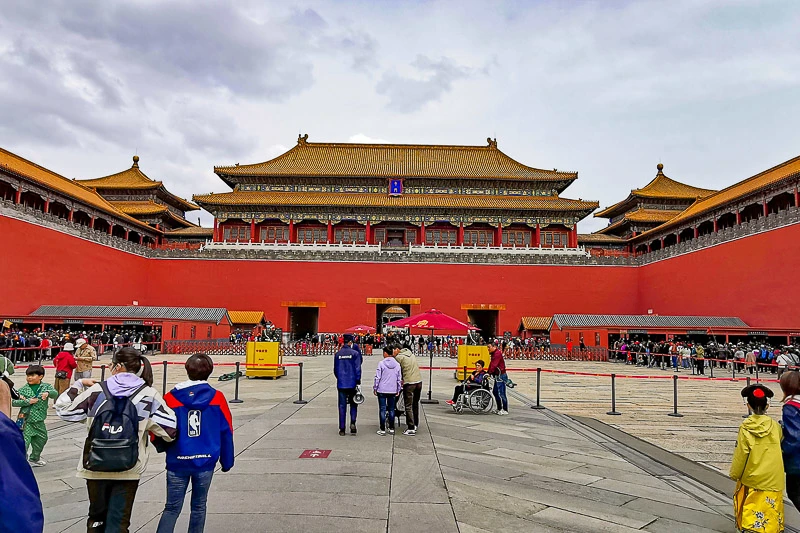
Then, you will arrive at another passport scan and bag check right outside Meridian Gate (Wǔ mén 午门), the actual entrance of Forbidden City.
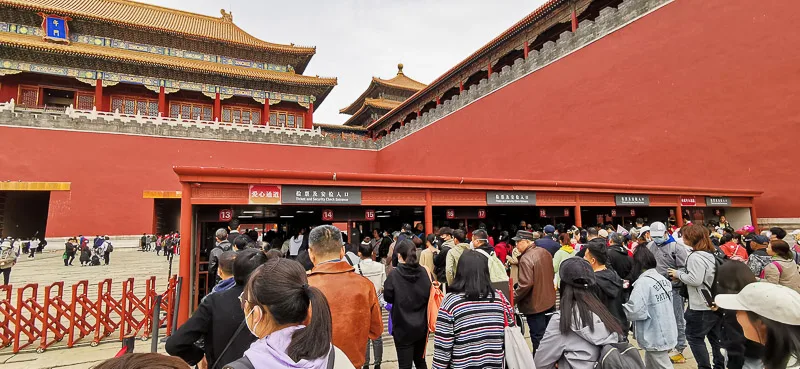
Forbidden City Brief History
Forbidden City was built between 1406 to 1420 by Emperor Yongle of the Ming Dynasty, the same emperor who instructed the construction of the original Temple of Heaven.
For 5 centuries, Forbidden City witnessed the enthronement of 14 Ming Emperors and 10 Qing Emperors. When the last Qing Emperor stepped down from the throne in 1912, Forbidden City became a museum that was open to the public in 1925. Forbidden City is also called the Palace Museum for its imperial architecture, art collection, artifacts and history.
Forbidden City can be divided into Inner Court and Outer Court. Outer Court refers to the southern area of the palace used for ceremonial purposes. Meanwhile the Inner Court refers to the northern area of the palace used as residence by the royal families.
Forbidden City Map
Below is the map that you will find as you explore all around Forbidden City (aka the Palace Museum). The map has both Chinese language and English language. And I especially love that the shape of each palace/hall is exactly the same as its original shape! That way, it’s really hard to get lost in this huge palace!
Because the original text is really small, I have added the English name to the map. If you want to see the large version, simply click on the link below the map.
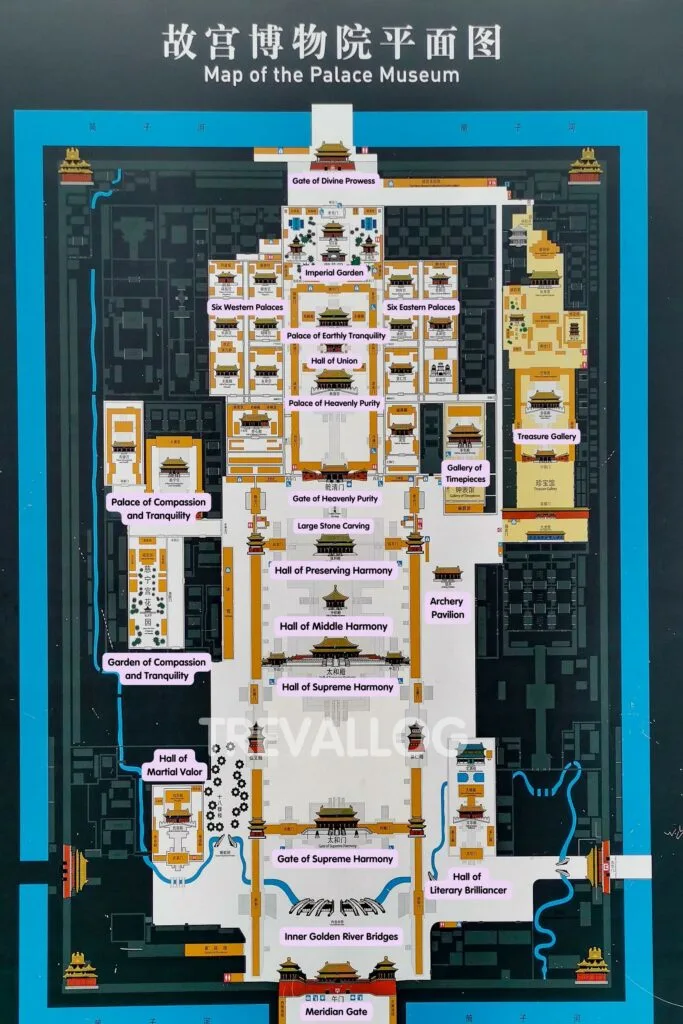
Forbidden City Audio Guide
If you want to learn the history of each hall in Forbidden City without hiring an actual tour guide, you can rent an audio guide.
The audio guide counter is located at Meridian Gate and Gate of Supreme Harmony.
The prices of the audio guide rental is as follow:
- Chinese language:
- Rental fee: RMB 20
- Deposit: RMB 40
- Foreign language
- Rental fee: RMB 40
- Deposit: 0
There are 35 available foreign languages. You can see the full list in the below photo. Some of the languages are: English, French, Netherlands, Portuguese, Czech, Spanish, Italian, Japanese, Korean, Thai, Indonesian, Bahasa Melayu, and Filipino.
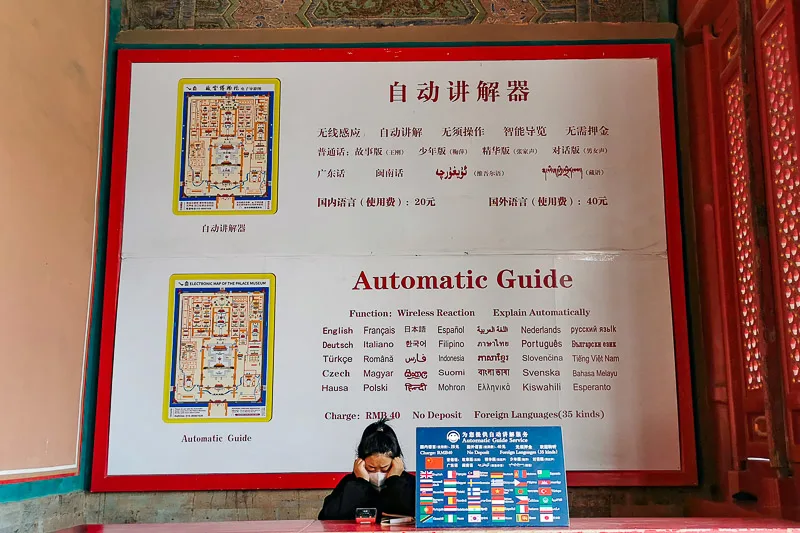
Suggested Itinerary & Route
Half-Day Itinerary (4 hours)
- Start at South Gate (Meridian Gate)
- Walk the Central Axis at Outer Court:
- Visit Gate of Supreme Harmony
- Visit Hall of Supreme Harmony
- Visit Hall of Middle Harmony
- Visit Hall of Preserving Harmony
- Walk the Central Axis at Inner Court:
- Visit Gate & Palace of Heavenly Purity
- Visit Hall of Union
- Visit Palace of Earthly Tranquilty
- Visit Imperial Garden
- Visit Gallery of Timepieces
- Visit The Treasure Gallery
- Exit via North Gate (Gate of Divine Prowess)
Full-Day Itinerary (6-8 hours)
- Start at South Gate (Meridian Gate)
- Walk the West Wing at Outer Court:
- Visit Hall of Martial Valor
- Walk the East Wing at Outer Court:
- Visit Hall of Literally Brilliance
- Walk the Central Axis at Outer Court:
- Visit Gate of Supreme Harmony
- Visit Hall of Supreme Harmony
- Visit Hall of Middle Harmony
- Visit Hall of Preserving Harmony
- Lunch at the Palace Restaurant near Archery Pavilion
- Walk the Central Axis at Inner Court:
- Visit Gate & Palace of Heavenly Purity
- Visit Hall of Union
- Visit Palace of Earthly Tranquilty
- Visit Imperial Garden
- Walk the West Wing at Inner Court:
- Visit 6 Western Palaces
- Walk the East Wing at Inner Court:
- Visit 6 Eastern Palaces
- Visit Gallery of Timepieces
- Visit The Treasure Gallery
- Exit via North Gate (Gate of Divine Prowess)
- Visit Jingshan Park
What to Do and See at Forbidden City
1. Meridian Gate
Meridian Gate (Wǔ mén 午门) is the visitor entrance of Forbidden City, located at the south of the Palace. It has 5 towers and is often called Five-Phoenix Tower.
Meridian Gate has 5 openings. In the past, the center opening is usually reserved only for Emperors. However, an empress is allowed to use this center opening once, which is during her wedding day. Today, the three middle openings are open for tourists.
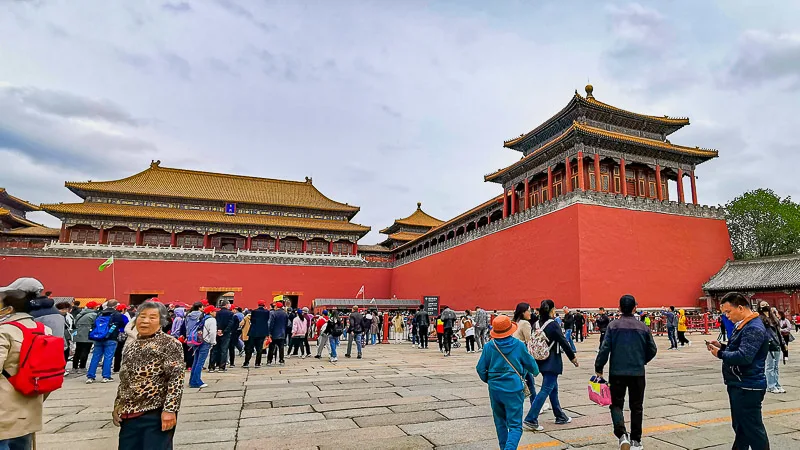
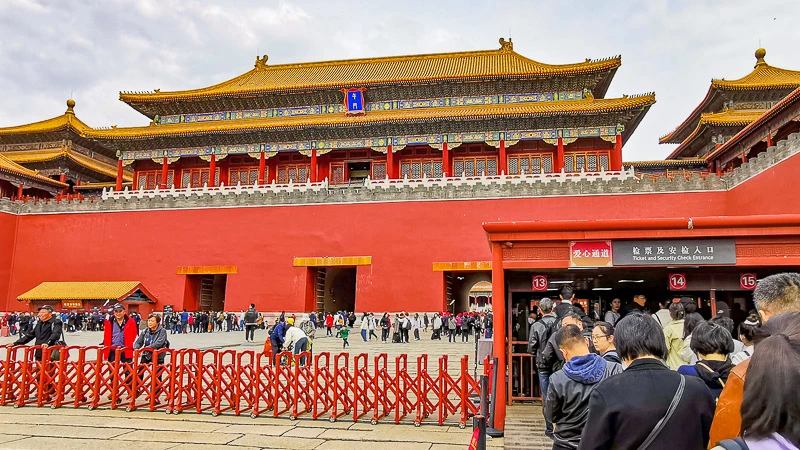
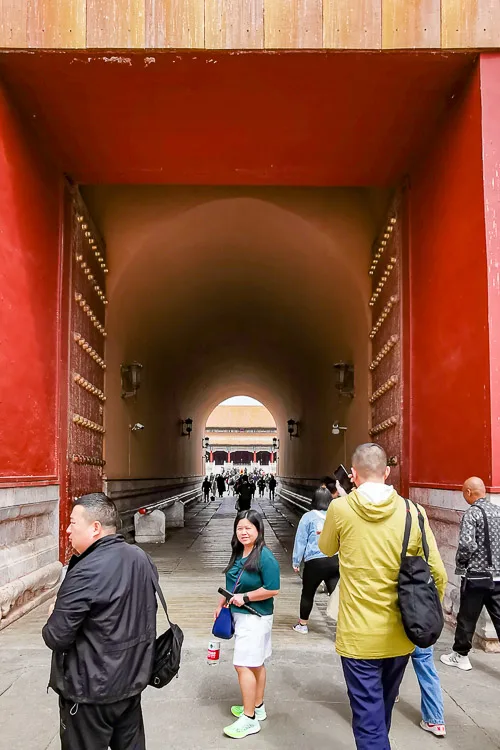
2. Courtyard at Outer Court
After passing through Meridian Gate, you will arrive at the Courtyard of the Outer Court. Here, you can see Inner Golden River Bridges as well as Gate of Supreme Harmony.
The Inner Golden River Bridges (Nèi jīn shuǐ qiáo 内金水桥) consists of 5 bridges overcrossing the snaking Inner Golden River underneath it. The river plays an important part in drainage system, flood and fire prevention in the Forbidden City.
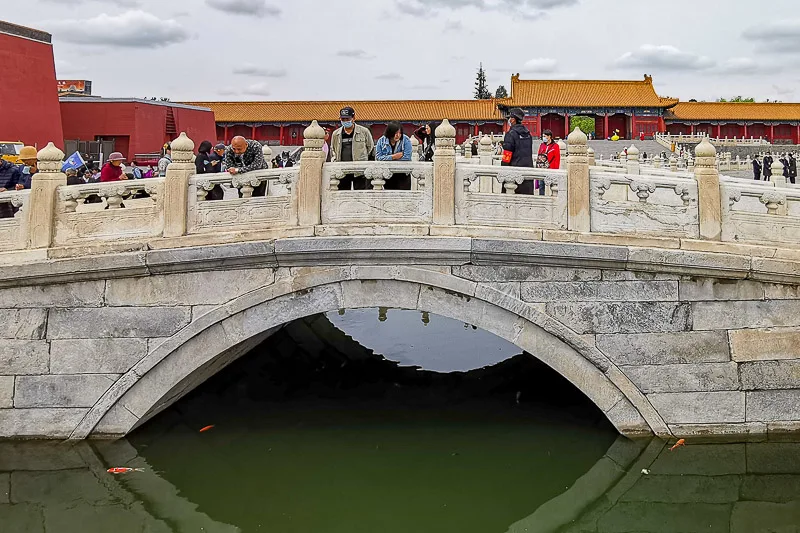
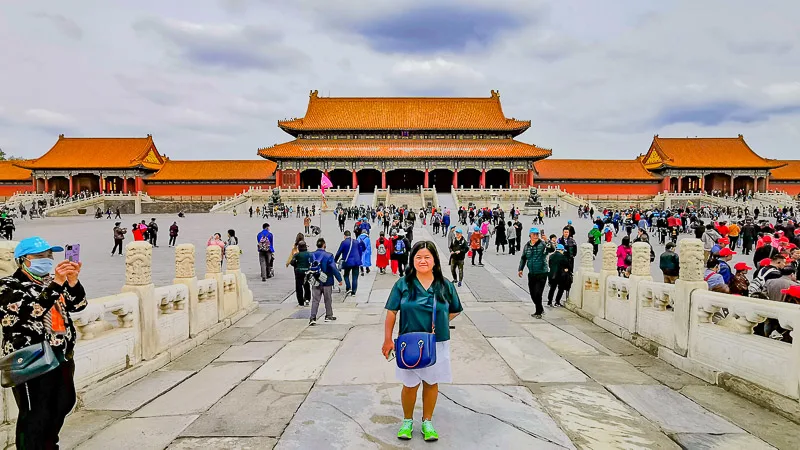
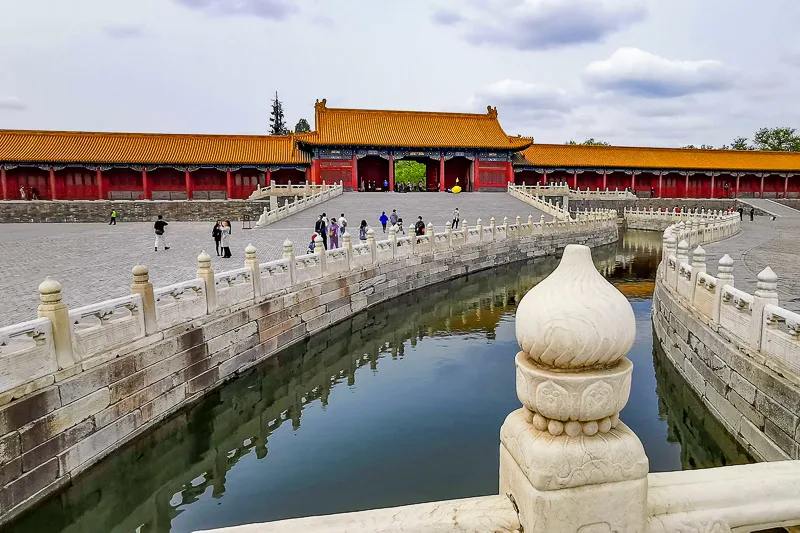
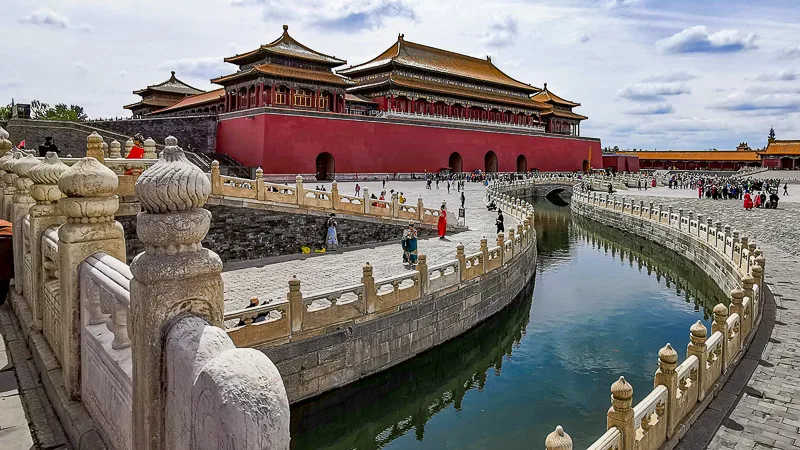
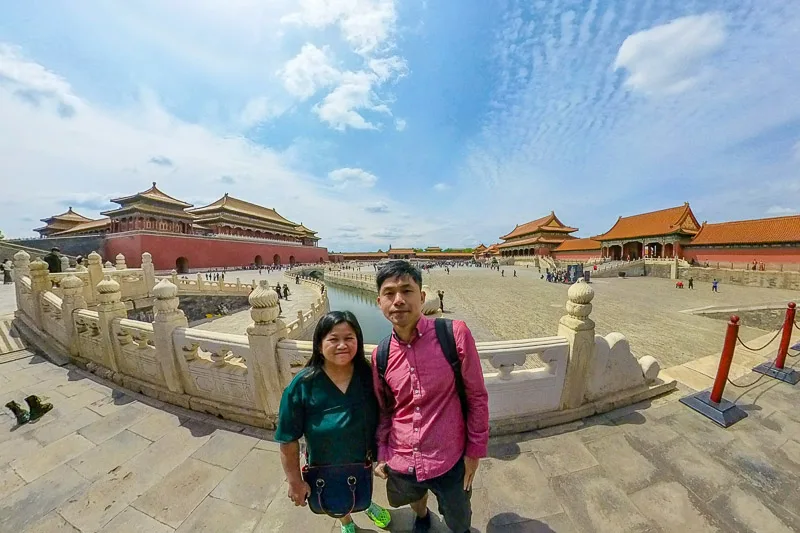
3. Hall of Martial Valor
Located at the west wing of the outer court, Hall of Martial Valor (Wǔ yīng diàn 武英殿) was used by various emperors for different purposes over the years.
Emperor Li Zicheng used it as enthronement ceremony in 1644. Prince Regent Dorgon used this hall for his office. In 1669, Kangxi Emperor used this hall as a place of residence. Today, Hall of Martial Valor serves as an exhibition hall for pottery collections.
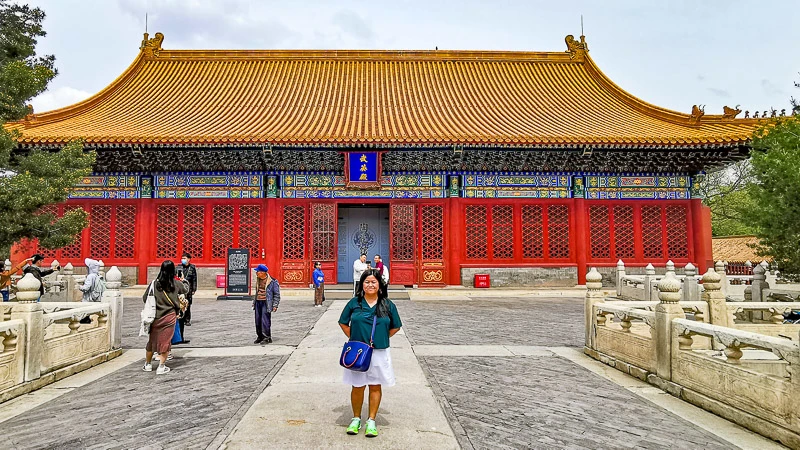
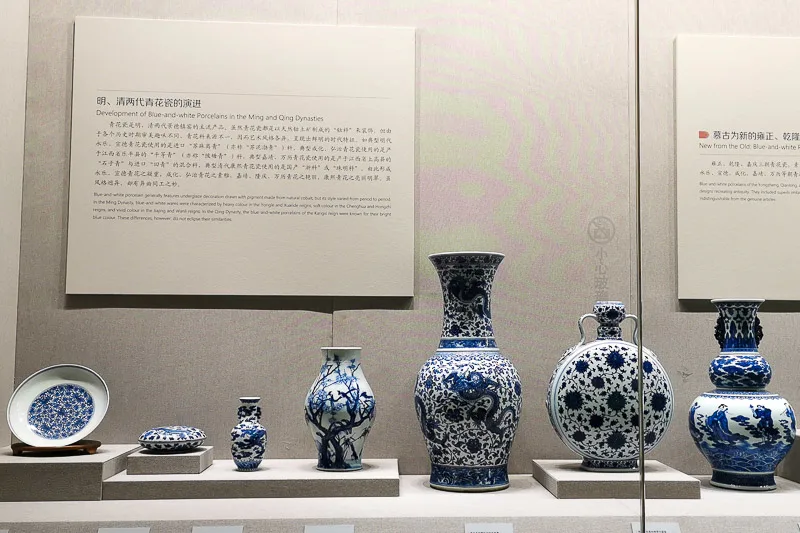
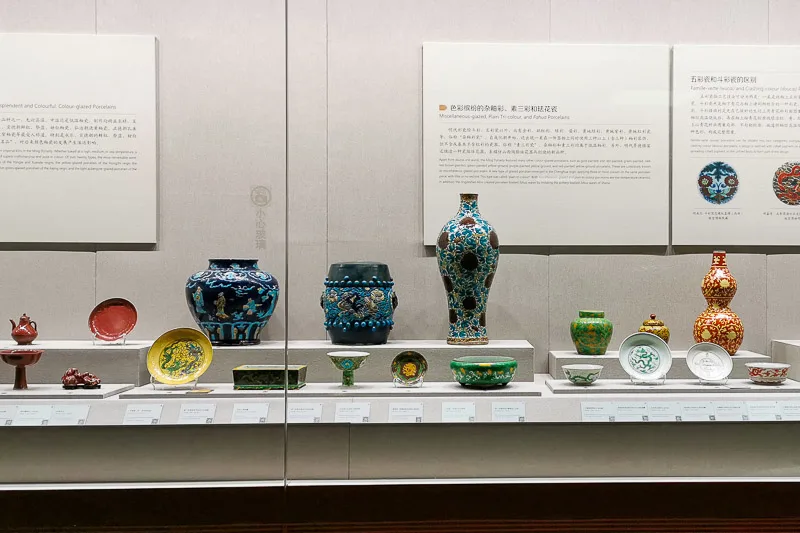
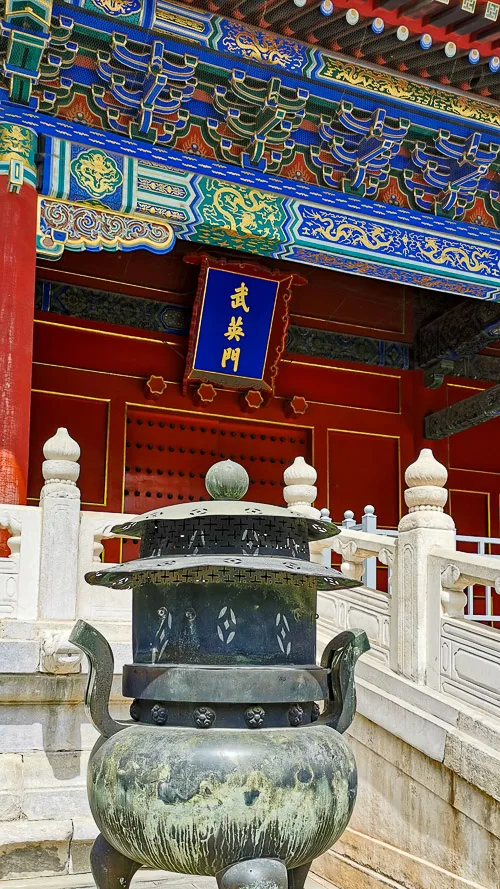
To the east of Hall of Martial Valor, you can find Broken Rainbow Bridge, a single-arch stone bridge paved with giant white marbles with side railings decorated with lion statues on the balusters.
The north of the bridge is the site of Eighteen Scholar Trees. Scholar trees were highly-prized trees; the tallest stands at 21m and the largest crown measure about 300sqm.
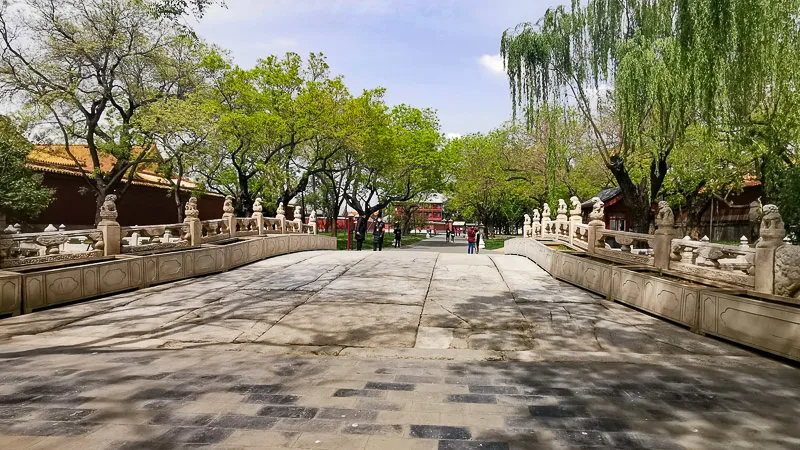
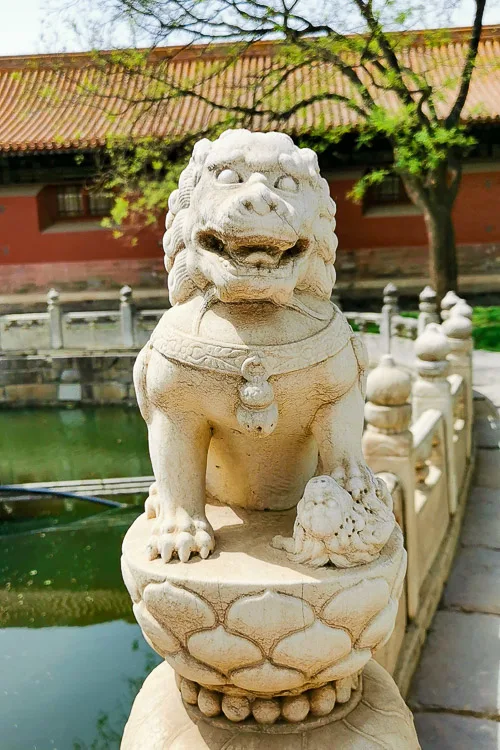
4. Hall of Literary Brilliance
Located at the east wing of the outer court, Hall of Literary Brilliance (Wén huá diàn 文华殿) was used as a residence for the crown prince, as well as a place of leisure for the Emperor.
Hall of Literally Brilliance and Hall of Martial Valor are both located symmetrically on the east and west side of the Forbidden City central axis.
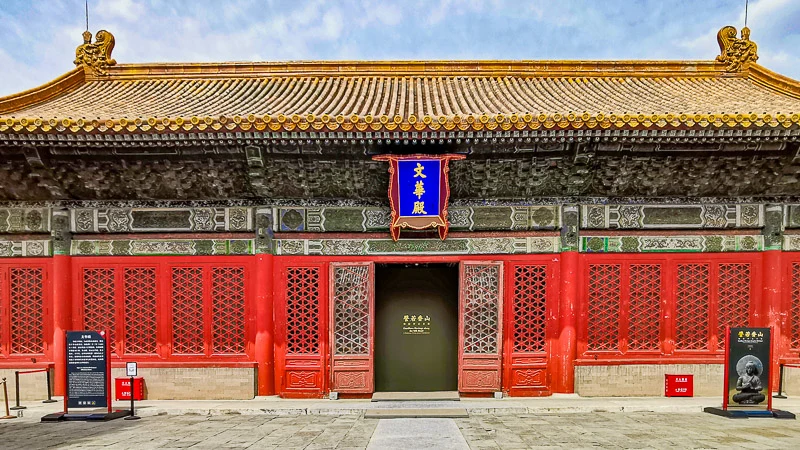
Behind the Hall of Literary Brilliance is the Wenyuan Pavilion.
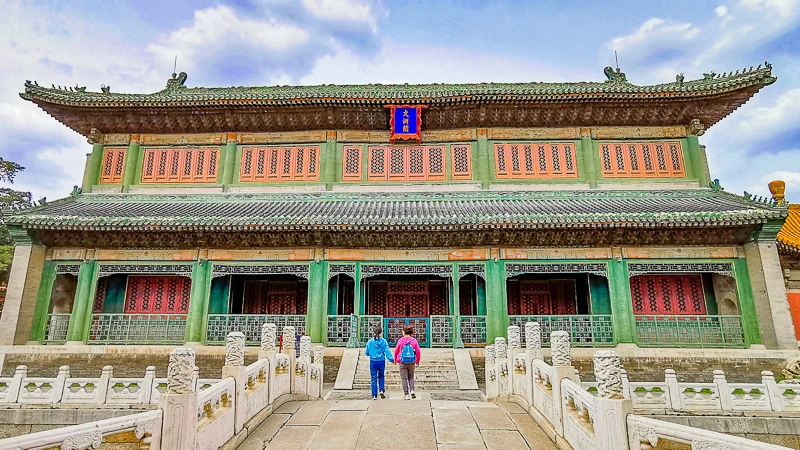
5. Archery Pavilion
Archery Pavilion (Jiàn tíng 箭亭) is located north of Wenyuan Pavilion, and east of Hall of Preserving Harmony. Outside the pavilion, there are prominent bronze ox statues.
Archery Pavilion were used by the emperors and princes of the Qing dynasty to practice archery and horse-riding skills.
A few meters away from Archery Pavilion is the Palace Museum Restaurant.
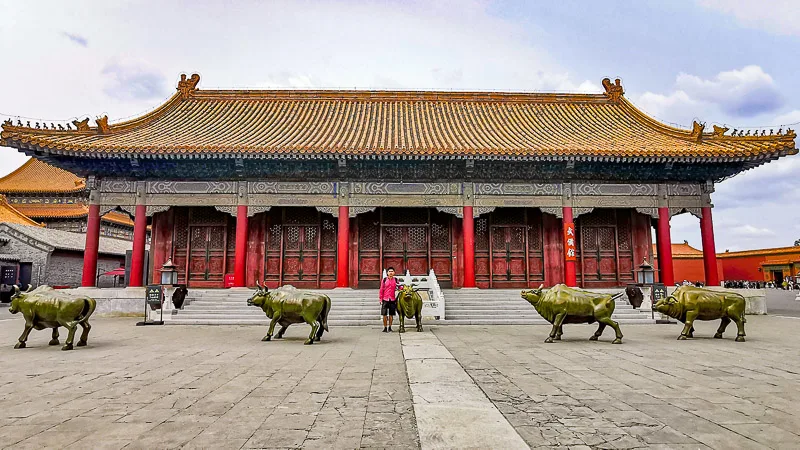
6. Gate of Supreme Harmony
Gate of Supreme Harmony (Tài hé mén 太和门) is the gate that precede the Hall of Supreme Harmony. It is guarded by a pair of bronze lions.
In the 1400s, Emperors Hongxi, Xuande and Yingzong from Ming Dynasty were enthroned here. In 1644, Shunzhi Emperor ascended the throne and issued the proclamation of Qing dynasty rule over the country.
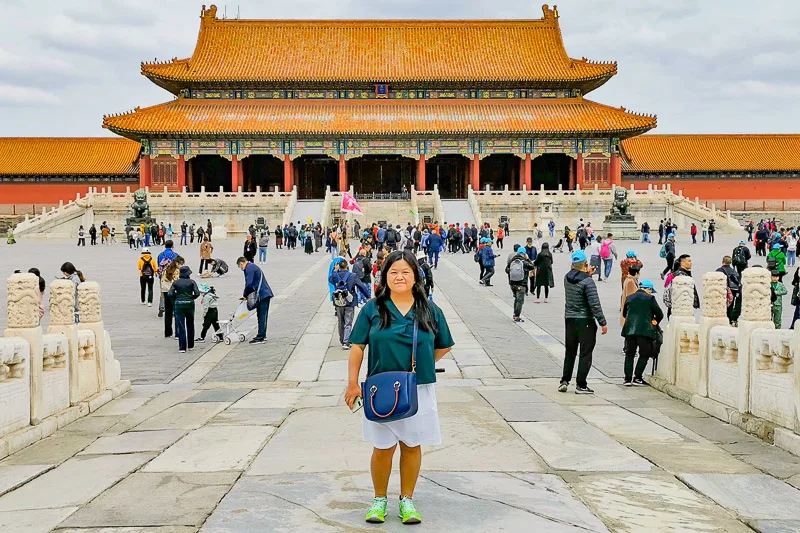
7. Hall of Supreme Harmony
Hall of Supreme Harmony (Tài hé diàn 太和殿) is the largest and most dignified hall in the Forbidden City. Located right in the heart of Forbidden City, Hall of Supreme Harmony stands on a three-tier marble terrace carved with dragon patterns.
Hall of Supreme Harmony has the most number of animals on its roof compared to any other halls. The higher the number of animals it has on its roof, the higher the palace ranks.
There are 10 animals on Hall of Supreme Harmony’s roof, namely Dragon, Phoenix, Lion, Sea Horse, Heavenly Steed, Ya Yu, Suan Ni, Xie Zhi, Dou Niu and Hangshi.
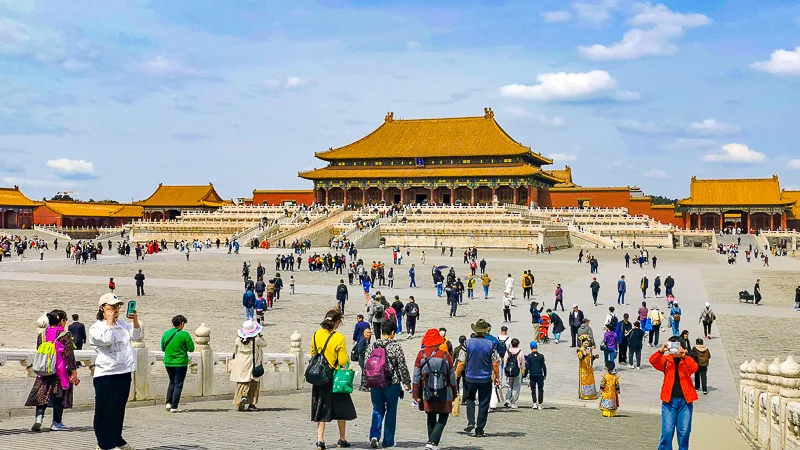
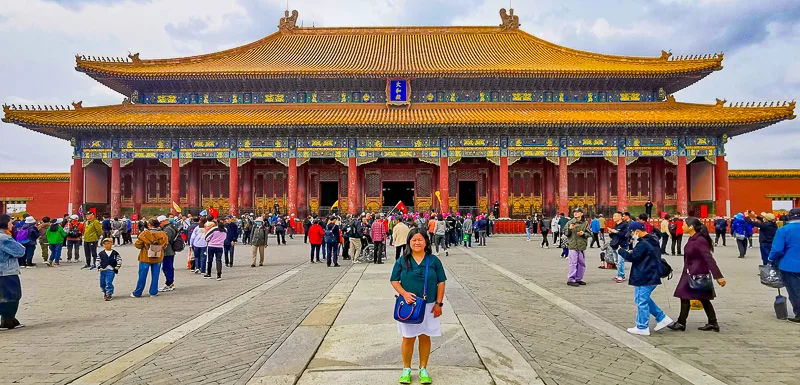
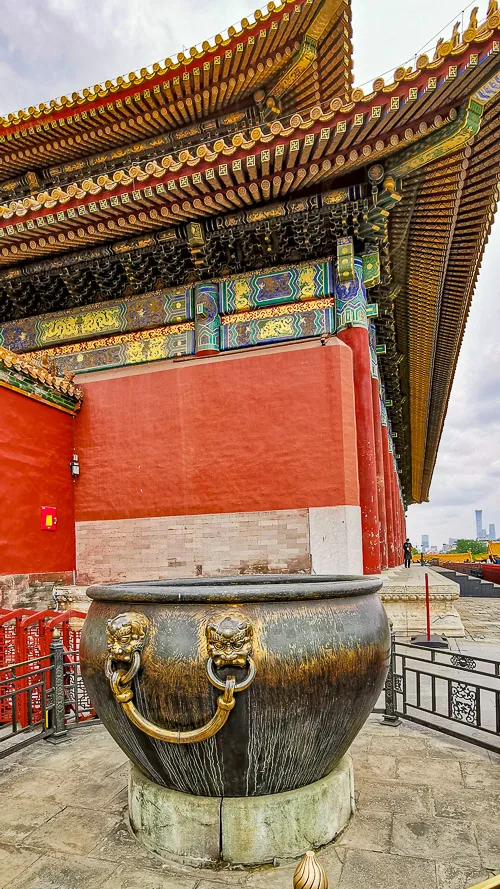
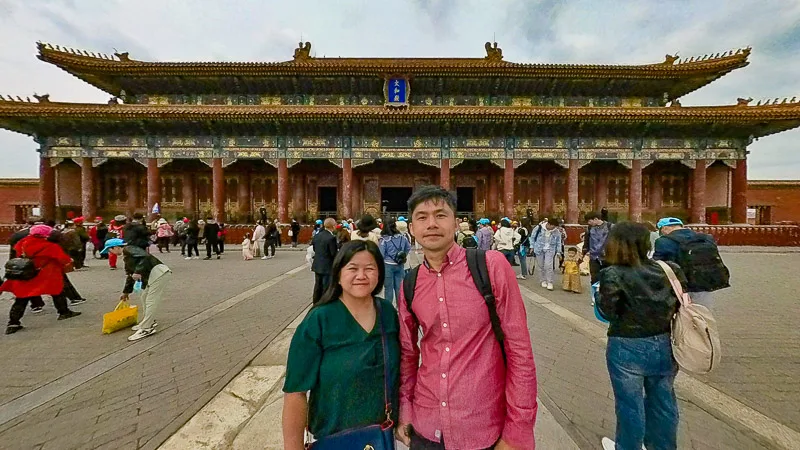
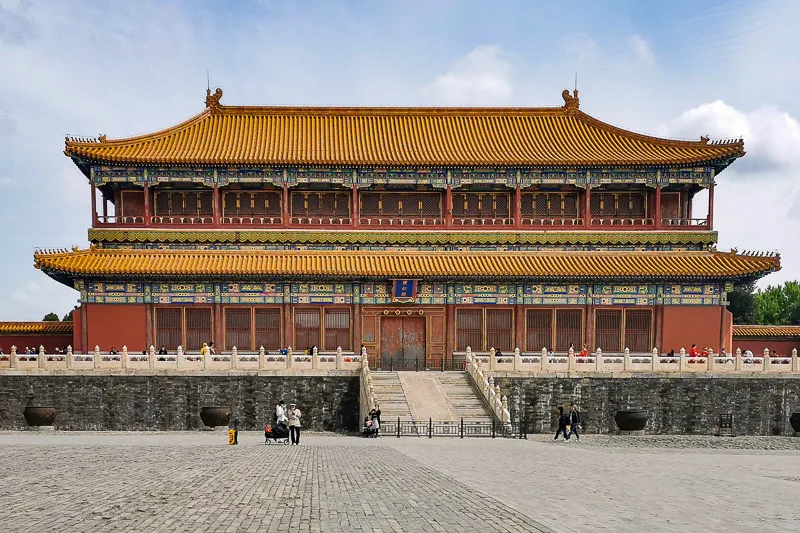
8. Hall of Middle Harmony
Hall of Middle Harmony (Zhōng hé diàn 中和殿) is a square hall located between Hall of Supreme Harmony and Hall of Preserving Harmony. It resembles the corridor that connected the front and rear halls of a grand palace building in ancient times.
Hall of Middle Harmony was the hall used by Emperors to receive homage from ceremonial officials before leading the ceremonies at Hall of Supreme Harmony.
On the day before sacrificial ceremonies to ancestor, heaven and earth, Hall of Middle Harmony was where the Emperors would review text of ceremonial addresses, inspect the seeds and farming tools to be used for ceremonies.
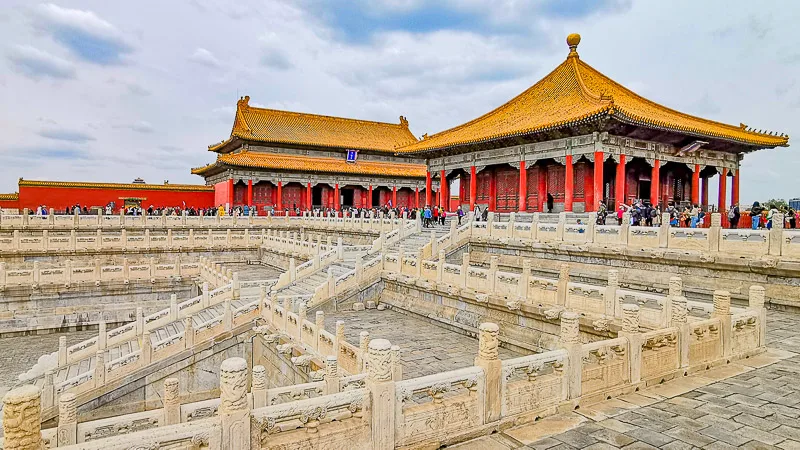
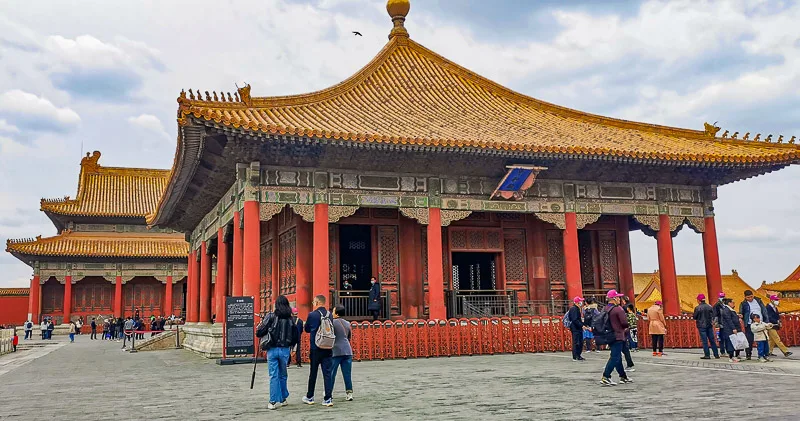
9. Hall of Preserving Harmony
Hall of Preserving Harmony (Bǎo hé diàn 保和殿) is a 1240sqm hall located to the north of Hall of Middle Harmony.
Hall of Preserving Harmony was used by Ming Dynasty Emperors to change their clothes before holding grand ceremonies. During Qing Dynasty, Emperors would host banquets here on the eve of Lunar New Year and the fifteenth day of first Lunar month.
Shunzhi Emperor held his wedding ceremony in Hall of Preserving Harmony. In 1789, during Emperor Qianglong’s reign, this hall was used for Palace Examinations.
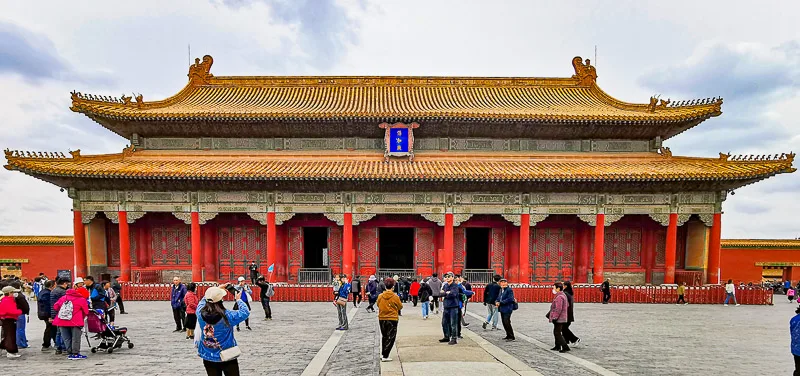
10. Large Stone Carving
Located right behind Hall of Preserving Harmony, Large Stone Carving (Dà shídiāo 大石雕) is a huge stone with dragon carvings at the center of the stairway. It is the largest stone carving in the Forbidden City, hence the name.
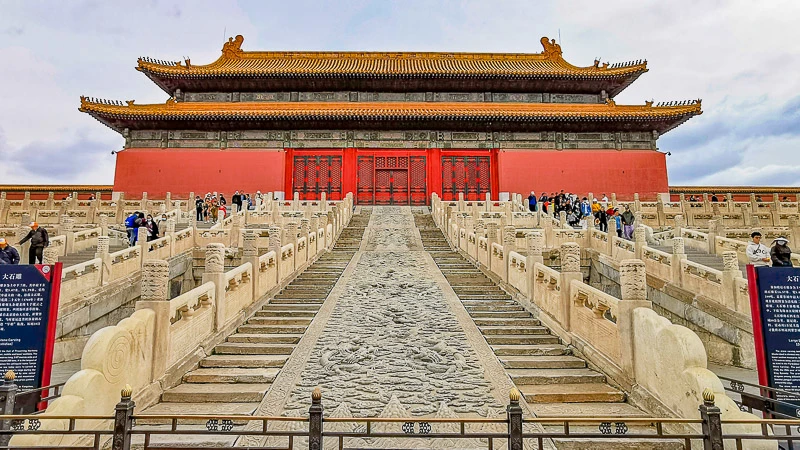
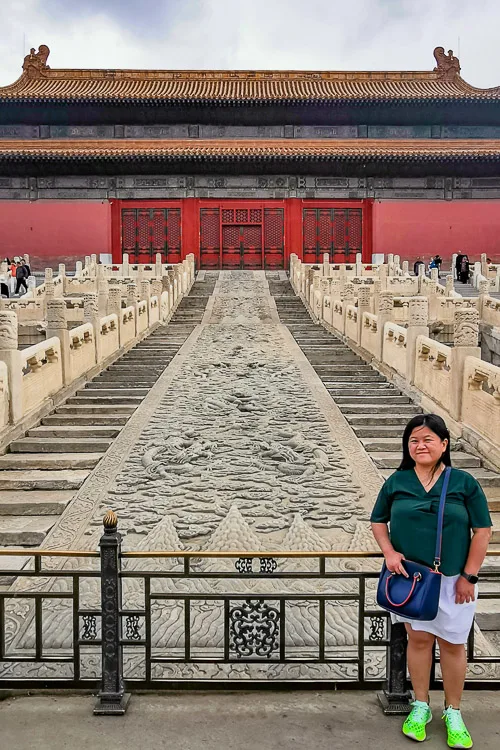
11. Gate of Heavenly Purity
Gate of Heavenly Purity (Qián qīng mén 乾清门) is the entrance to the inner court of Forbidden City. In front of the gate, there is a pair of bronze lion statues and a pair of bronze water vats. During Qing Dynasty, Emperors held Morning Audience at this gate.
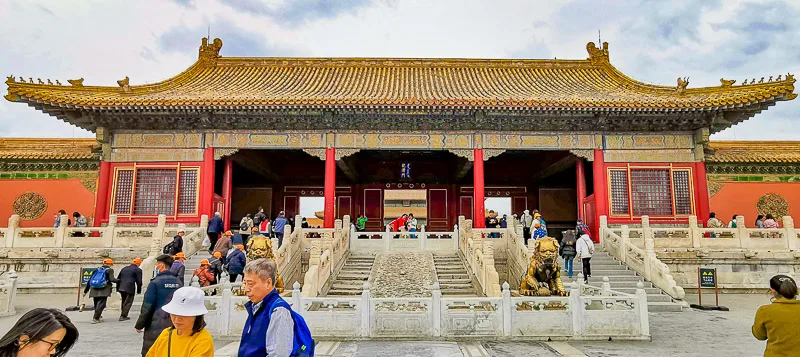
12. Palace of Heavenly Purity
Palace of Heavenly Purity (Qián qīnggōng 乾清宫) was the Emperor’s residence during the Ming Dynasty since 1420 until the early reign of Qing Dynasty.
In 1722, Emperor Yongzheng of Qing Dynasty moved his sleeping quarters to the Hall of Mental Cultivation. From then on, Palace of Heavenly Purity served as an important venue for Emperors to handle daily government affairs.
In addition, Palace of Heavenly Purity was where the coffin of the deceased Emperor was placed. It was believed that he should end his days in his bedchamber.
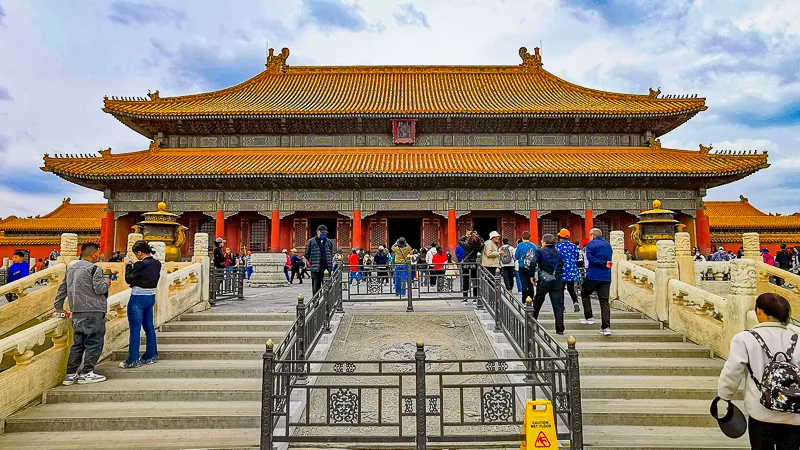
A tablet written with words 正大光明 (zhèngdà guāngmíng) which means “justice and honour” can be found in the Palace of Heavenly Purity.
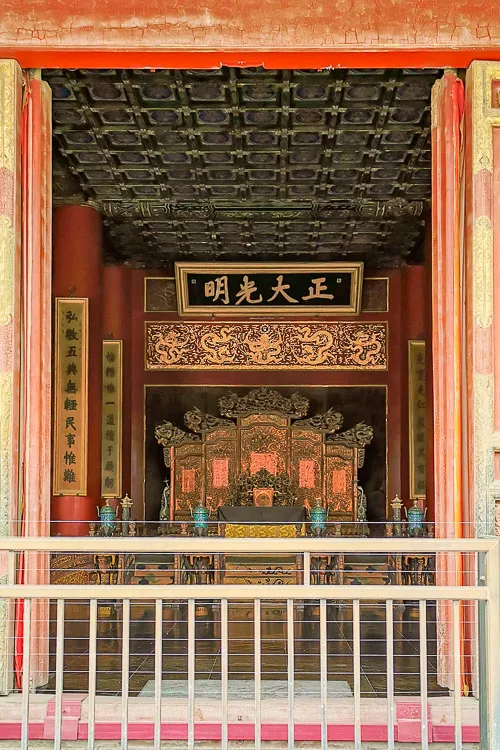
13. Hall of Union
Hall of Union (Jiāo tài diàn 交泰殿) is a hall about the union of the celestial (Heaven) and the terrestrial (Earth). It is aptly named for its location, which is between Palace of Heavenly Purity and Palace of Earthly Tranquility.
Hall of Union was used by the Empress to receive greetings from high-ranking ladies during major festivals.
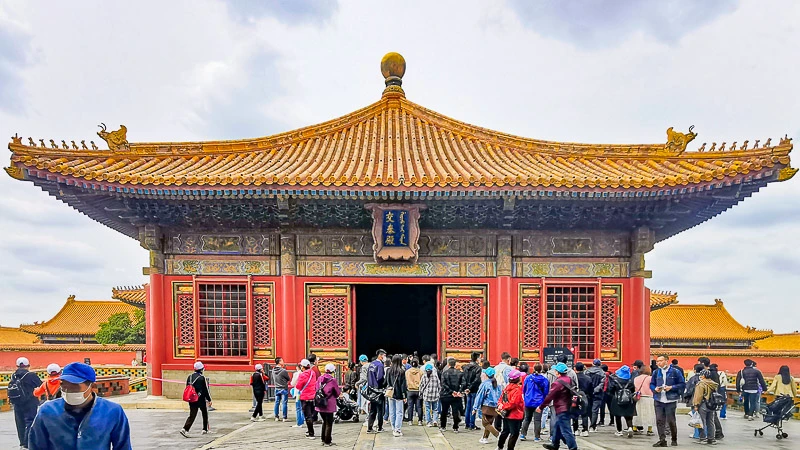
A signboard inscribed with the words 無爲 wúwèi, which means non-interference, is hung above the throne. The Shunzhi Emperor (who reigned from 1644 to 1661) placed this signboard with a warning: “Eunuchs are forbidden to interfere with political affairs”.
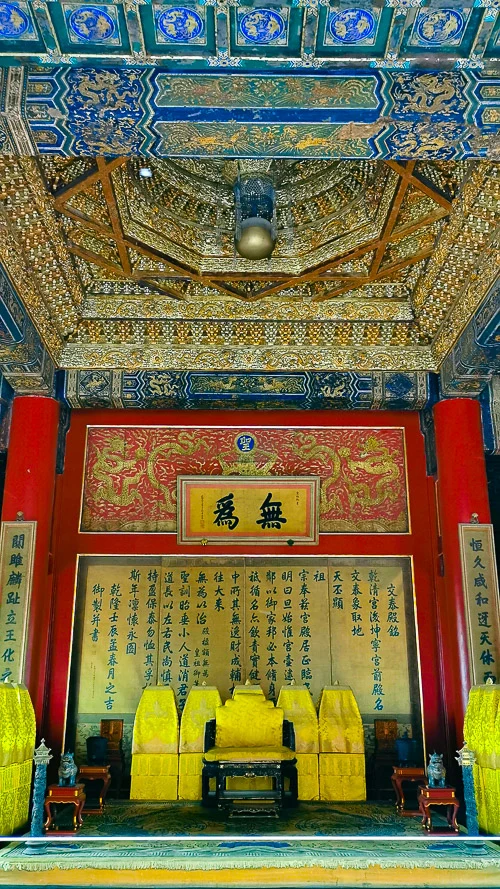
14. Palace of Earthly Tranquility
Palace of Earthly Tranquility (Kūn níng gōng 坤宁宫) was used as the residence of the Empress during the Ming Dynasty. It pairs with the Palace of Heavenly Purity as the residence of Emperor.
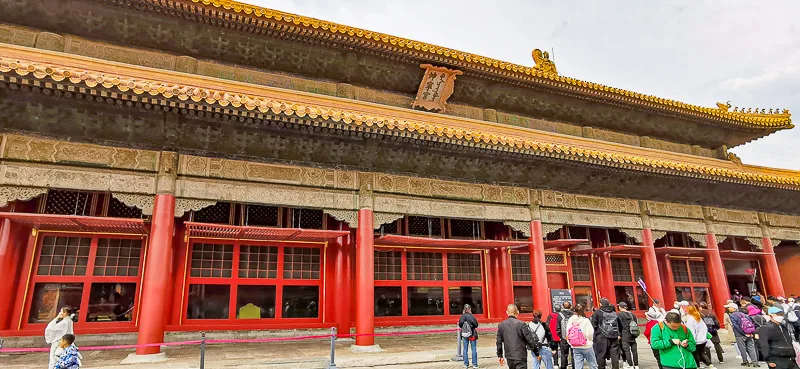
15. Imperial Garden
Imperial Garden (Yù huāyuán 御花园) is located to the north of Palace of Earthly Tranquility. The garden is home to various trees, flowers, halls, pavilions and many other structures.
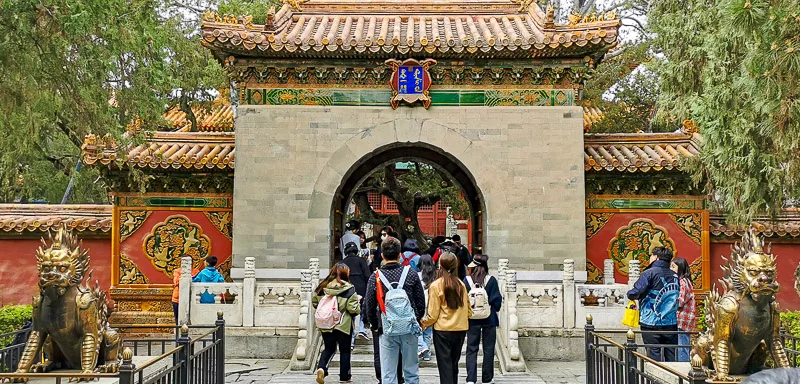
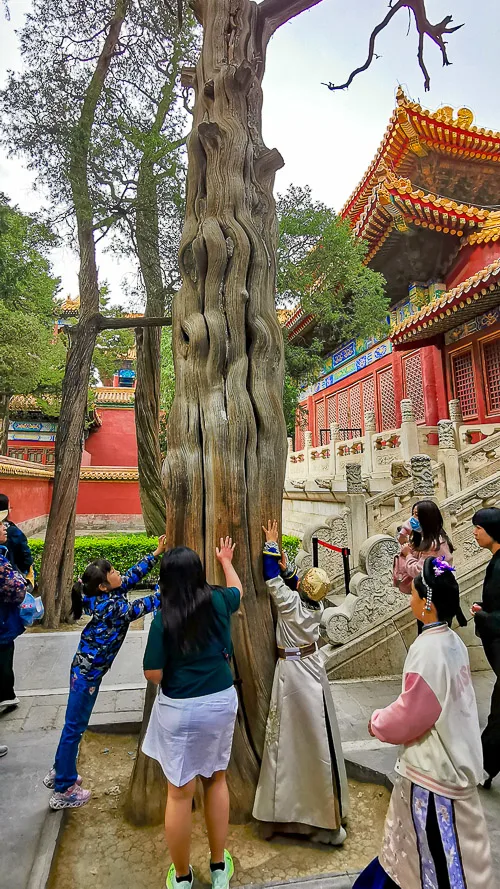
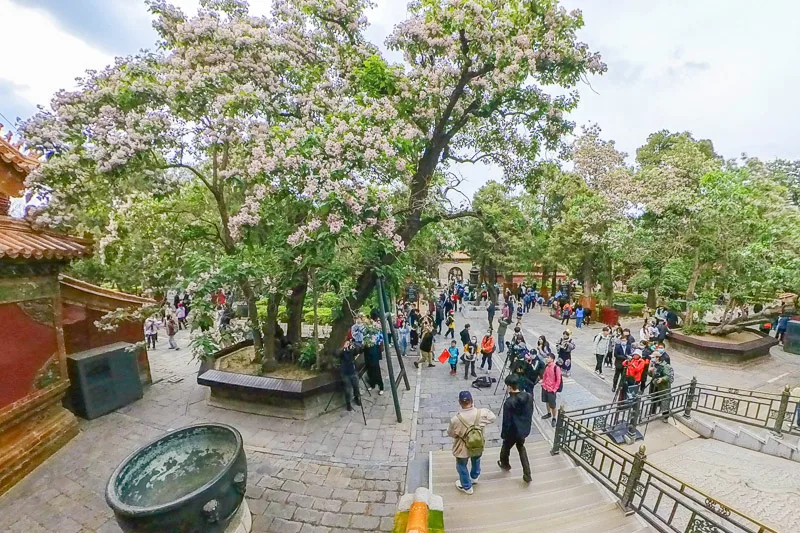
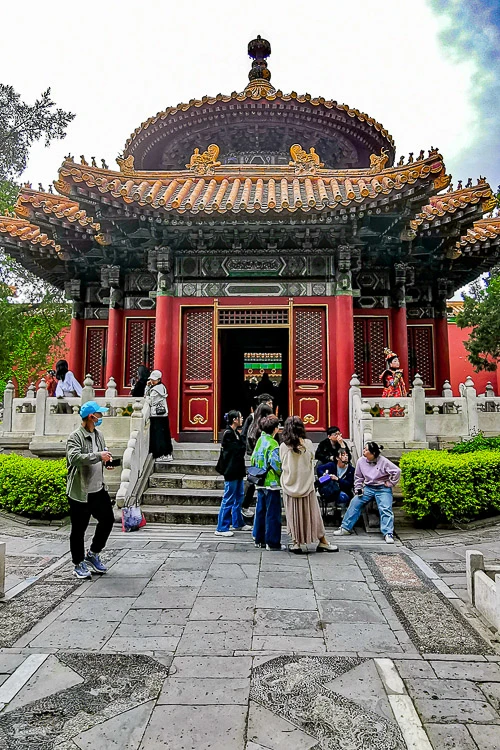
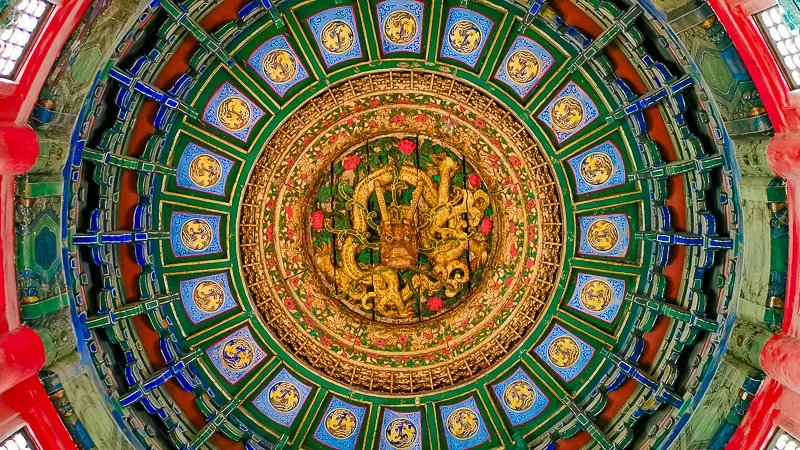
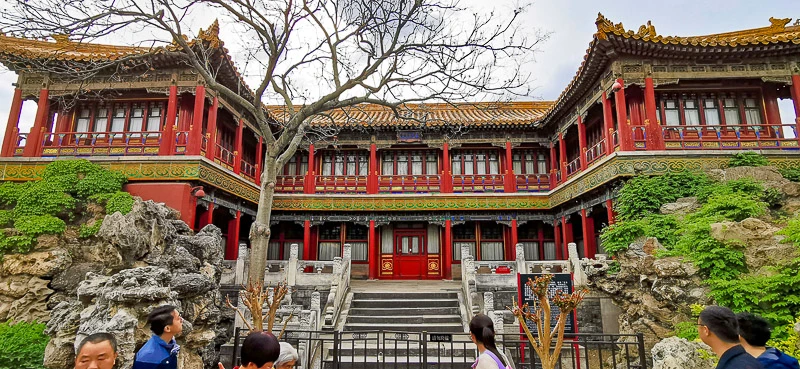
16. Six Western Palaces
Located at the West Wing of Inner Court is the Six Western Palaces, which contains:
- Palace of Universal Happiness
- Palace of Gathered Elegance
- Palace of Eternal Spring
- Palace of Earthly Honour
- Hall of Supreme Principle
- Palace of Eternal Longevity
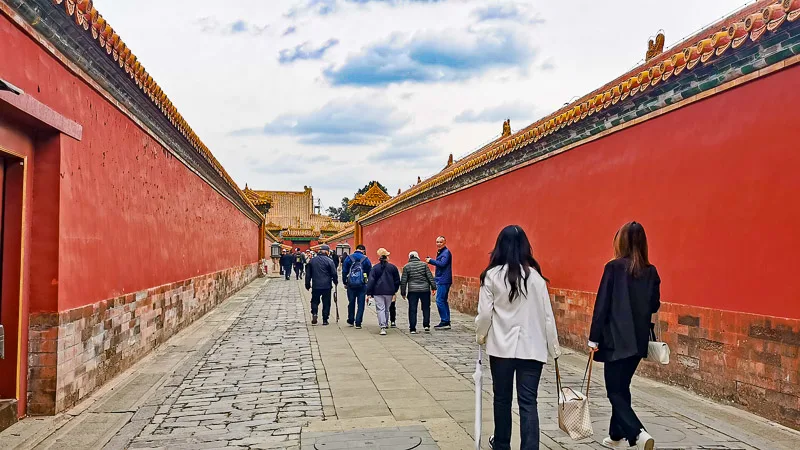
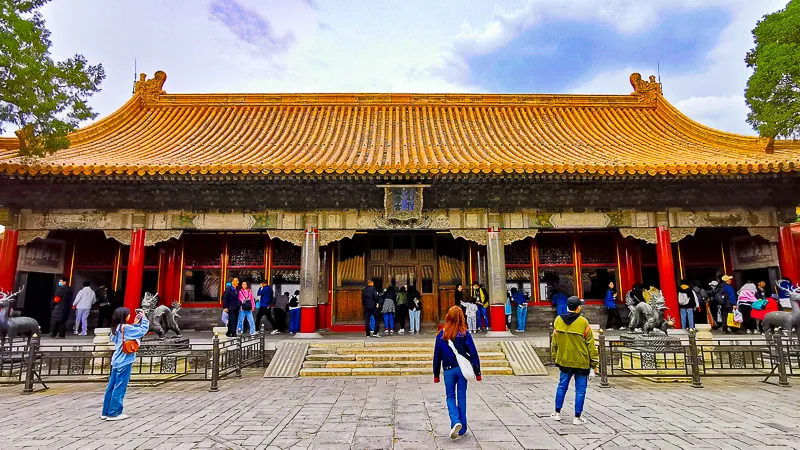
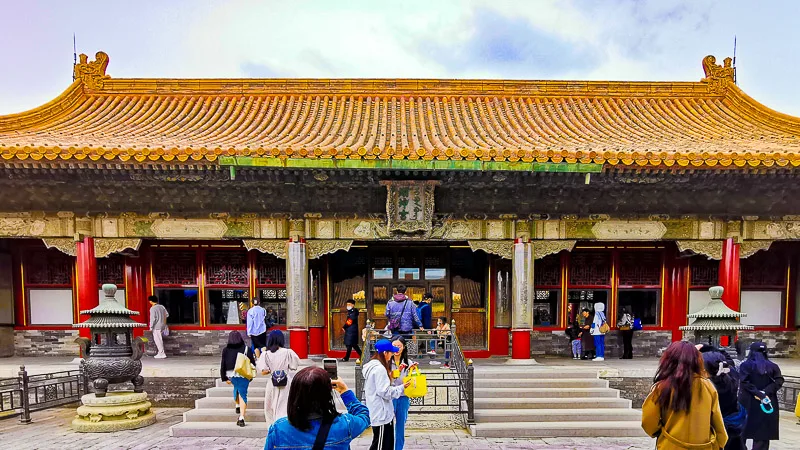
17. Six Eastern Palaces
Located at the East Wing of Inner Court is the Six Eastern Palaces, which contains:
- Palace of Accumulated Purity
- Palace of Great Brilliance
- Palace of Celestial Favour
- Palace of Eternal Harmony
- Palace of Great Benevolence
- Palace of Prolonging Happiness

18. Treasure Gallery
Treasure Gallery is a gated exhibition located at the east wing of Forbidden Palace. The admission is RMB 10 per person.
Treasure Gallery displays about 400 pieces of artefacts from mostly Qing Dynasty. These treasures are housed in Hall of Imperial Supremacy, Hall of Spiritual Cultivation, Hall of Joyful Longevity and Bower of Well-Nourished Harmony.
Sadly, we missed out this gallery due to time constraints.
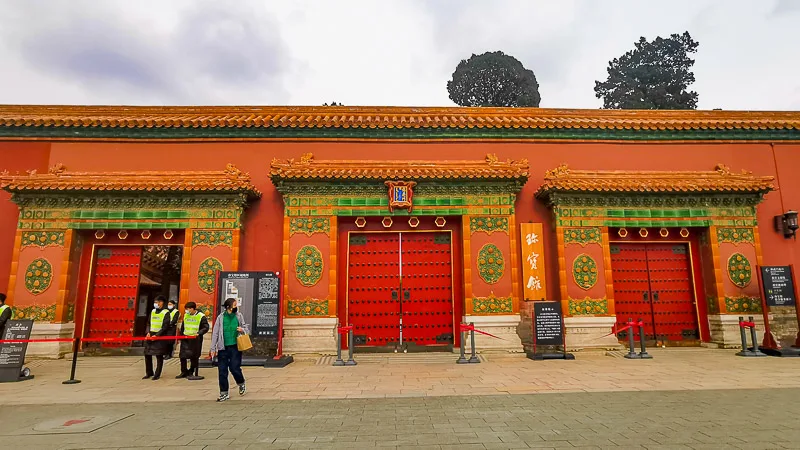
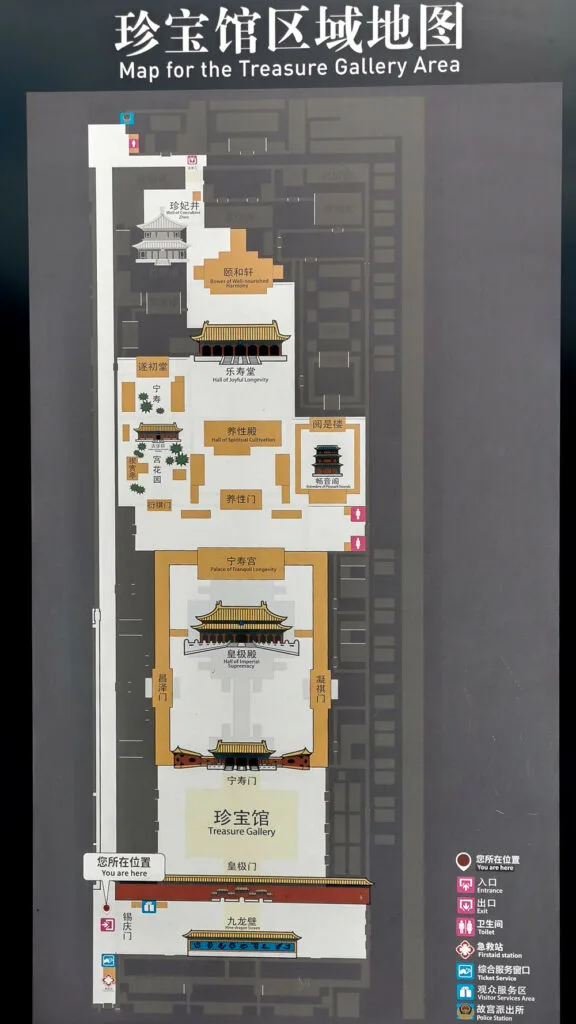
19. Gallery of Timepieces
Gallery of Timepieces is a gated exhibition located at the east wing of Forbidden Palace, next to the Treasure Gallery. The admission is RMB 10 per person. We totally missed out this gallery because it’s quite hidden, hence no photos =(
20. Gate of Divine Prowess
Gate of Divine Prowess (Shénwǔ mén 神武门) is the North Gate of Forbidden City. It is the exit gate for visitors.
Walk to the side of the gate and you will see the moat that surrounds the Forbidden City. Cross the road and you will arrive at Jingshan Park.
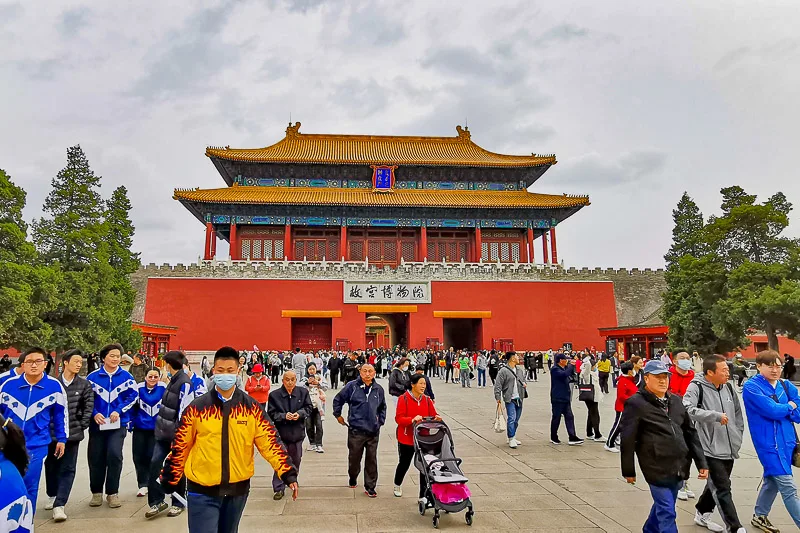
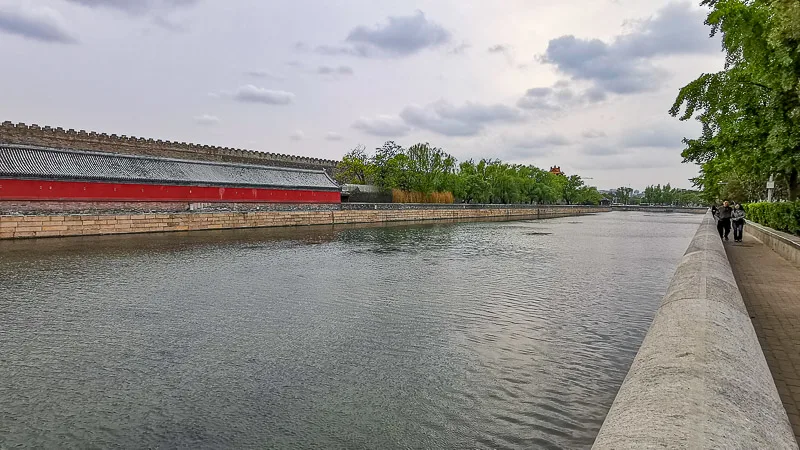
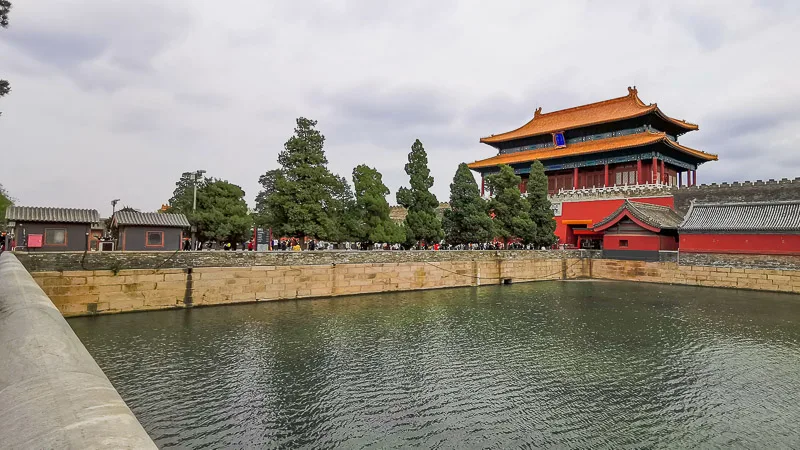
21. Jingshan Park
Although not located inside Forbidden City, Jingshan Park (Jǐngshān gōngyuán 景山公园) is where you should head to at the end of your visit to Forbidden City.
From the viewing deck of Jingshan Park, you can see the roofs of all structures in Forbidden City. To get to the viewing deck, you will have to climb staircases and uphill walkway.
To go to Jingshan Park from Gate of Divine Prowess, walk towards the west and cross the road via an underground tunnel.
Ticket costs RMB 10 for adults, and RMB 5 for children. We bought the ticket directly from the ticket counter, we didn’t pre-book it. We paid with Alipay.
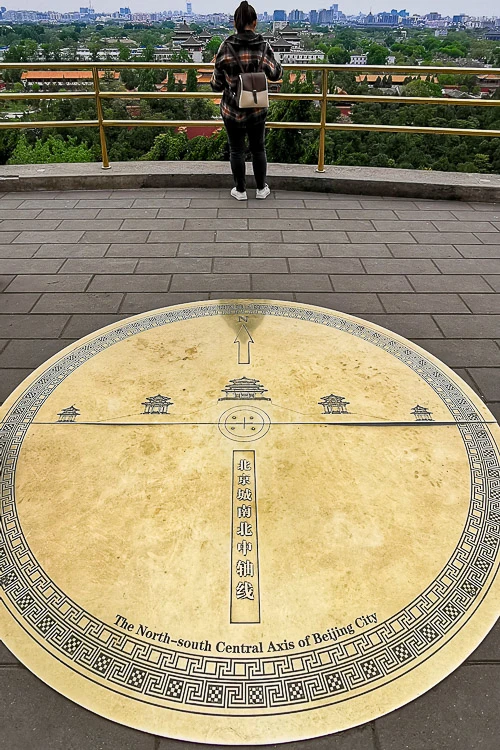
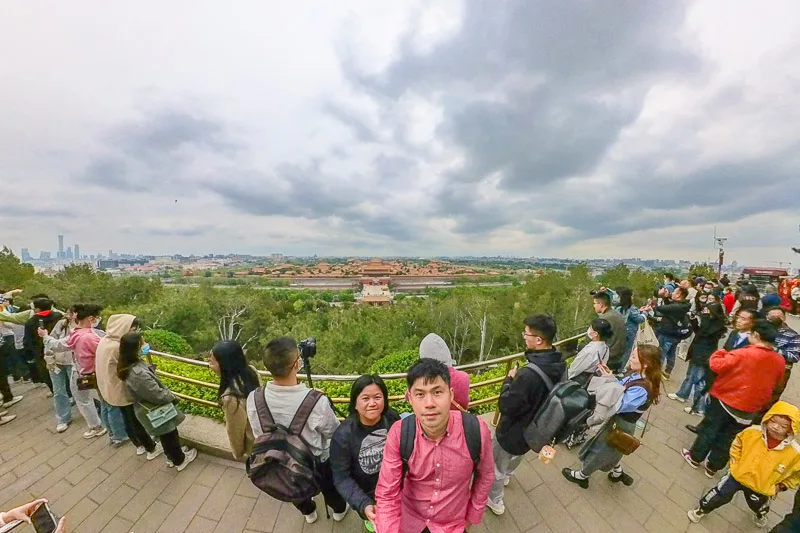
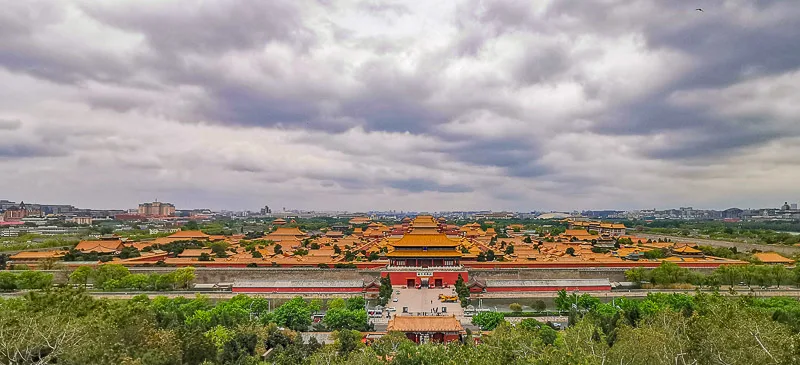
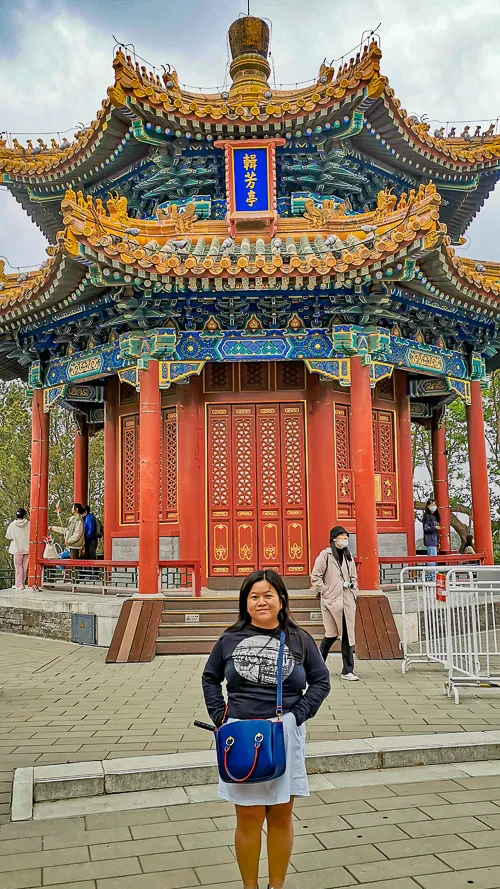
What to Eat at Forbidden City
Since the ticket to Forbidden City doesn’t allow re-entry, if you’re planning to spend an entire day at Forbidden City, you’ll have no choice but to eat inside Forbidden City. But fret not, there are several restaurants inside Forbidden City.
The Palace Museum Restaurant
The main Palace Museum Restaurant is located at east of Hall of Preserving Harmony near Archery Pavilion. The price is slightly expensive compared to outside, but service is quite fast.
We ordered beef rice (RMB 55) and fried rice (RMB 58). The price is final, there was no more taxes in addition to what was stated in the menu. We paid using Alipay.
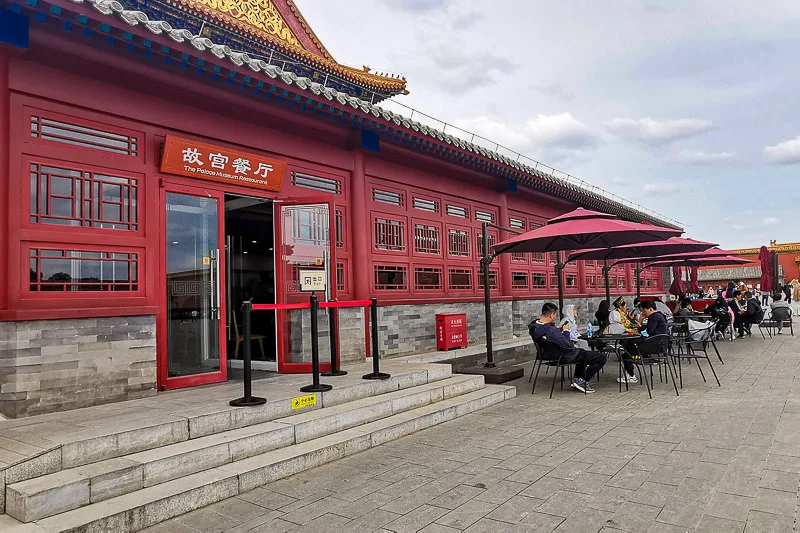
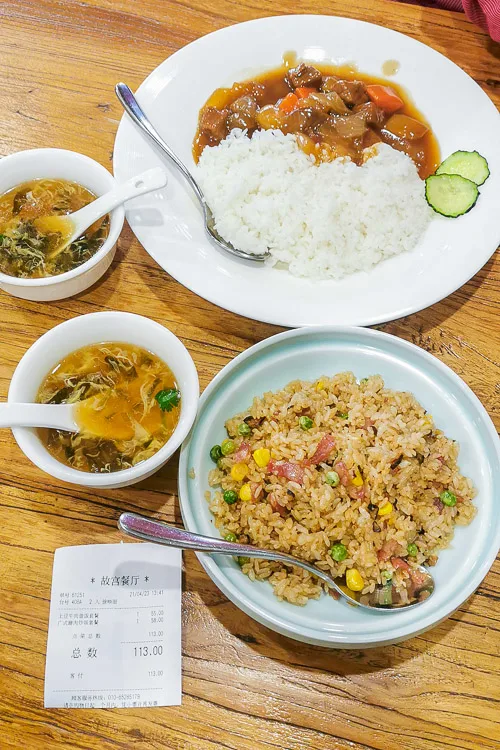
Not every restaurants sell main dishes. The one near Imperial Garden sells finger food, such as croissant (RMB 13), hotdog (RMB 28) and soup.
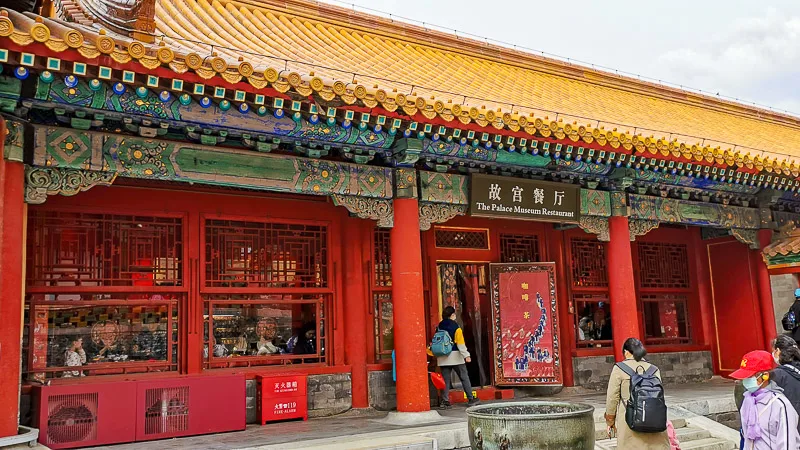
If you like my work, you can buy me a coffee! Your support will help me to keep going!

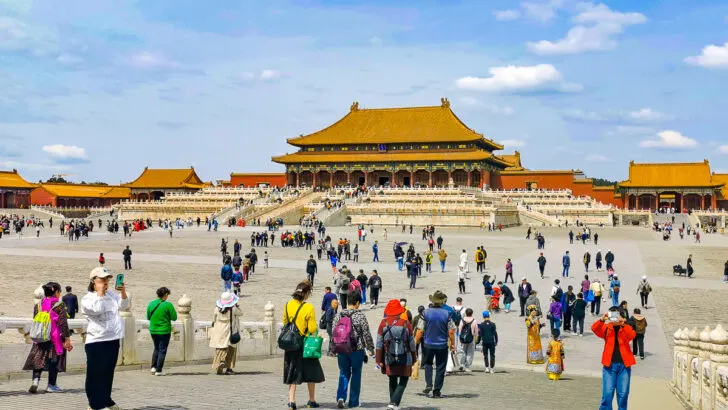
James
Sunday 10th of December 2023
Hi Eva,
How long in advance did you book for the Forbidden City tickets through the online agent?
It feels that the OTA is a bit uncertain but as you've said, booking through WeChat may not work for us foreigner. Thanks
James
Thursday 28th of December 2023
@Eva,
Thanks so much, I have benefitted from your website a lot. Allow me to share with you and your readers some very crucial information about booking Forbidden City tickets. As you have rightfully said, it can be quite a confusing affair and indeed, I have been asking around including my friends in China and no one knew how to do it except through the "official channel" which is the WeChat mini program. Even so, I tried several times and it was not working.
However, I am pleased to share that as of today (28.12.23) I found the ridiculously easy answer. The WeChat booking is ONLY FOR Chinese citizens and I believe residents in China (meaning those who work there with a local number, accounts, etc). Tourists and foreigners are to BUY THEIR TICKETS ONLINE at their official website (dpm.org.cn). Indeed, they do NOT appoint any official third-party contractors to sell their tickets. Buying their tickets online is ridiculously easy and professional, no different from buying groceries through RedMart!
It's amazing how simple it was. The problem is people (including me initially) who browsed their website didn't read the information very carefully and it was easy to overlook the one-paragraph information. The situation is then made worse by being told to book through WeChat only.
Luckily I didn't buy through the OTA yet (only as my last resort) which otherwise would be much more expensive (twice the price) and there's a risk that e.g. the agency might register the details incorrectly thus being denied entry. Oh, when I wanted to book through an OTA, I also realised that they didn't provide complete information. For example, they indicate that those below 18 can buy a cheaper student ticket. On the official channel, if we read carefully, it states that discounted student tickets require proof of student registration at the gate. Imagine the hassle, might as well just buy a full adult ticket without a discount!
Hope this is helpful to your readers visiting your blog!
Eva
Tuesday 19th of December 2023
Hi James, I booked mine 7 days in advance. The ticket ran out quite fast so I had to monitor it a few days before they released the slot for the date that I wanted to visit. Based on recent reviews, seems like most people had a smooth redemption experience, so I hope all is well now!
Bryant Chang
Tuesday 15th of August 2023
Hello Eva, Thank you for your great guide! May I ask if foreign tourists must book a ticket to Jingshan Park online in advance? Did you just buy your ticket at the ticket office by showing your passport and pay using Alipay? I'm going to Beijing this autumn and have been researching beforehand. I'm really looking forward to your response. Love, Bryant
Bryant Chang
Wednesday 16th of August 2023
@Eva, Thank you so much for your prompt reply. You're such a great help!
Eva
Wednesday 16th of August 2023
Hi Bryant, there was no need to book ticket to Jingshan Park in advance. We were able to buy from the ticket office directly. Most locals bought ticket using online app, so the line at ticket office was not that long. Yes, we just showed our passport and we paid using Alipay.
Hope you have a great trip to Beijing!